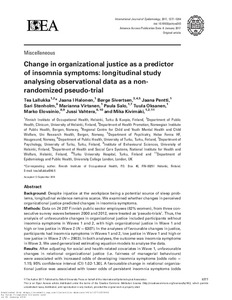Change in organizational justice as a predictor of insomnia symptoms: longitudinal study analysing observational data as a non-randomized pseudo-trial
Tea Lallukka; Jaana I Halonen; Børge Sivertsen; Jaana Pentti; Sari Stenholm; Marianna Virtanen; Paula Salo; Tuula Oksanen; Marko Elovainio; Jussi Vahtera; Mika Kivimäki
Change in organizational justice as a predictor of insomnia symptoms: longitudinal study analysing observational data as a non-randomized pseudo-trial
Tea Lallukka
Jaana I Halonen
Børge Sivertsen
Jaana Pentti
Sari Stenholm
Marianna Virtanen
Paula Salo
Tuula Oksanen
Marko Elovainio
Jussi Vahtera
Mika Kivimäki
OXFORD UNIV PRESS
Julkaisun pysyvä osoite on:
https://urn.fi/URN:NBN:fi-fe2021042717318
https://urn.fi/URN:NBN:fi-fe2021042717318
Tiivistelmä
Background: Despite injustice at the workplace being a potential source of sleep problems, longitudinal evidence remains scarce. We examined whether changes in perceived organizational justice predicted changes in insomnia symptoms.Methods: Data on 24 287 Finnish public sector employees (82% women), from three consecutive survey waves between 2000 and 2012, were treated as 'pseudo-trials'. Thus, the analysis of unfavourable changes in organizational justice included participants without insomnia symptoms in Waves 1 and 2, with high organizational justice in Wave 1 and high or low justice in Wave 2 (N = 6307). In the analyses of favourable changes in justice, participants had insomnia symptoms in Waves 1 and 2, low justice in Wave 1 and high or low justice in Wave 2 (N = 2903). In both analyses, the outcome was insomnia symptoms in Wave 3. We used generalized estimating equation models to analyse the data.Results: After adjusting for social and health-related covariates in Wave 1, unfavourable changes in relational organizational justice (i.e. fairness of managerial behaviours) were associated with increased odds of developing insomnia symptoms [odds ratio = 1.15; 95% confidence interval (CI) 1.02-1.30]. A favourable change in relational organizational justice was associated with lower odds of persistent insomnia symptoms (odds ratio = 0.83; 95% CI 0.71-0.96). Changes in procedural justice (i.e. the fairness of decision-making procedures) were not associated with insomnia symptoms.Conclusions: These data suggest that changes in perceived relational justice may affect employees' sleep quality. Decreases in the fairness of managerial behaviours were linked to increases in insomnia symptoms, whereas rises in fairness were associated with reduced insomnia symptoms.
Kokoelmat
- Rinnakkaistallenteet [27094]
